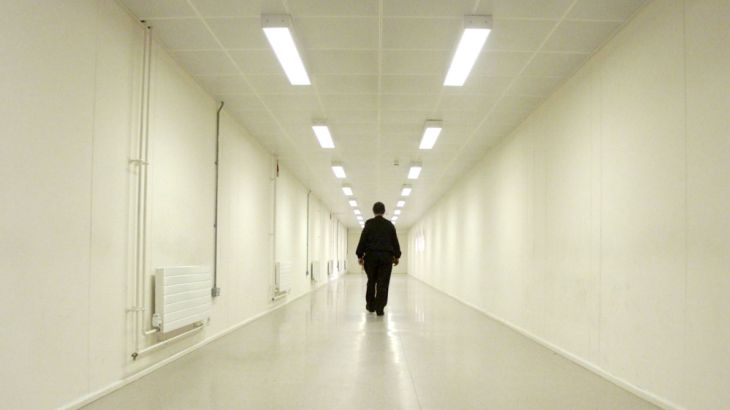Why are women held at Yarl’s Wood on hunger strike?
Immigrants and asylum seekers protest against indefinite detention in UK as activists and politicians raise concerns.

When Jasmina – not her real name – looked out the window from a UK detention centre earlier this week and saw snow, she thought of the countryside she used to call home.
“I can‘t tell you how much I long to be free. From my town I can see the Pennines and when it snows up there, it‘s just beautiful,” she told Al Jazeera on Tuesday.
Keep reading
list of 4 itemsCyprus suspends asylum applications for Syrians as arrivals rise
Agadez, Niger’s gateway to the Sahara, finds new life in the migrant trade
Forced from home, these Colombians struggle to live in a basketball stadium
“Here, however, my view is a fence fringed with barbed wire.“
She has been held at the Yarl‘s Wood Immigration Removal Centre in Bedfordshire, almost 100km north of London, for three months, waiting to find out whether she will be deported.
There are around 400 detainees at the centre, which is run by a private corporation – Serco.
Most of the detainees are women, and have been sent there because the government wants to verify their identities or facilitate their immigration claims.
But Jasmina and scores others are, campaigners say, victims of the government‘s controversial detention policy, which allows for migrants and asylum seekers to be held indefinitely in nine detention centres across the UK.
Jasmina and a number of the Yarl’s Wood facility’s detainees recently went on hunger strike to pressure authorities into a policy change.
As of Monday, around 45 detainees had vowed to fast until the government reinstates a 28-day limit on immigrant detention, according to SOAS Detainee Support, a campaign group.
“People consistently talk about the pain of not knowing when they will be released,” Shadin Nabulsi, a member of SOAS Detainee, told Al Jazeera.
“Not knowing what will happen or when is massively anxiety inducing.“
The protest follows an earlier three-day hunger strike last week, which 120 detainees reportedly took part in, also aimed at the government‘s detention policy.
Opposition politicians concerned
Diane Abbott, shadow home secretary of the opposition Labour Party, described the situation as “desperate” following a visit on February 23.
Abbott said the Home Office had previously rejected her multiple attempts to visit the centre.
On Tuesday at the House of Lords, Brian Leonard Paddick, a Liberal Democrat politician, asked the government what steps it had taken to resolve the issue.
“Does the minister agree that one of the main reasons for the hunger strikes is that people are being detained unfairly, unreasonably and indefinitely? One woman has described it as like being kidnapped, not knowing when it will end or what will happen to her.“
Susan Frances Maria Williams, a politician of the ruling Conservative Party, replied that the detainees could be refusing food for “dietary and religious reasons”.
For its part, the government has said it tries to limit detention times.
“When people are detained, it is for the minimum time possible and detention is reviewed on a regular basis,” a Home Office spokesperson told Al Jazeera.
“Detention and removal are essential parts of effective immigration controls, especially in support for the removal of those with no lawful basis to stay in the UK.“
Last year, 63 percent of detainees were held for less than a month, the spokesperson added.
Government statistics also show the number of people entering detention in the UK has fallen by 5 percent, from 30,418 to 27,331, since 2013.
Critics such as Detention Forum, a coalition of anti-detention NGOS, argue that immigration cases should be resolved while allowing immigrants and asylum seekers to remain in their communities, as opposed to holding them in detention centres.
The group said 52 percent of people leaving detention between 2016 and 2017 were allowed to remain in the UK, which “raised questions over the necessity of their detention“.
Hunger strike disputes
Despite the hunger strike being confirmed by several witness accounts, reports, and politicians, Serco, the company contracted by the Home Office to manage the centre, denied that detainees are refusing to eat.
“There is not a hunger strike at Yarl‘s Wood. There [was] an increased number of people who chose not to attend meals in the restaurant for the two days prior to Ms Abbott‘s visit but that has subsided now,” a spokesperson for the company, who requested anonymity, told Al Jazeera.
“Anyone refusing all food is closely monitored and supported via healthcare. However on this occasion, food purchases from the centre‘s shop increased, so we know that people were eating.“
But Helena – not her real name – a detainee at the centre for the last two and a half months, told Al Jazeera she had not eaten in at least 48 hours and will continue striking until the protesters’ message is heard.
“We want the Home Office to listen to us and stop the injustice of indefinite detention,” she said.
“It is the uncertainty that is most difficult, I can deal with imprisonment if I know my sentence. But here, there’s no criminal record, and no clarity about what’s going to happen to me. It’s a pain that we all bear on a daily basis.”